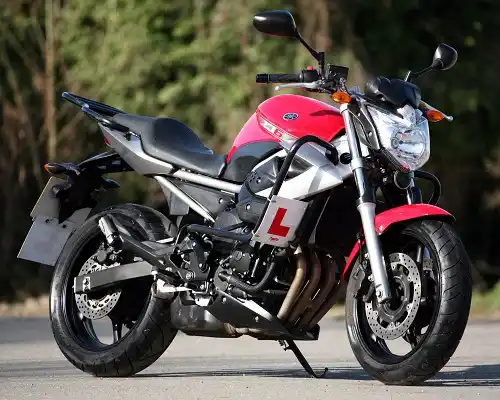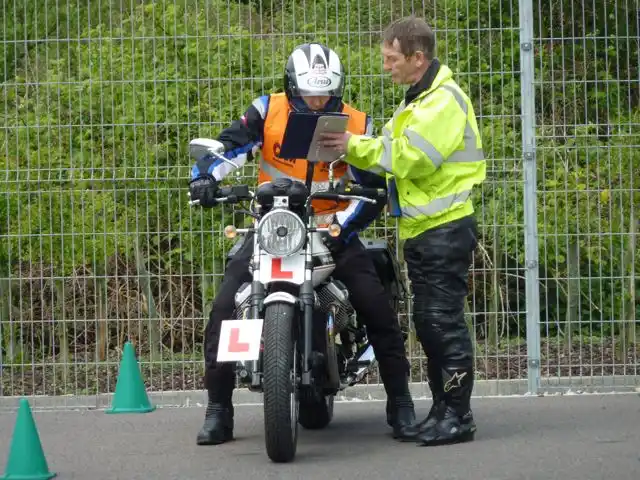Book motorbike training in Kendal, Cumbria with any of the companies listed here
Click on any of the motorcycle training schools below to view more information and check availability.
Northern Route Kendal
25, Lake District Business Park, Kendal, Cumbria, LA9 6NH
Approx. distance: 1.1 miles
Farkles Motorcycle Training Sedbergh
Station Road, Sedbergh, Westmorland and Furness, LA10 5HP
Approx. distance: 7.9 miles
RIDE Motorcycle Training Carnforth
Unit 11F, Keer Park, Carnforth, Lancashire, LA5 9FG
Approx. distance: 13.7 miles
Real Rider Motorcycle Training Barrow in Furness
Vickerstown Foolball Club, Mill Lane, Barrow in Furness, LA14 3NN
Approx. distance: 25.7 miles
Raceways Rider Training Lancashire
48-60 Dock Street, Fleetwood, Lancashire, FY7 6AG
Approx. distance: 30 miles
Cumbria Motorcycle Training Workington
Moorclose Community Centre, Needham Drive, Workington, Cumbria, CA14 3SE
Approx. distance: 38.6 miles
West Pennine Motorcycle Training Blackburn
West Pennine Road Safety Centre, Blackburn, Lancashire, BB1 3ES
Approx. distance: 41.5 miles
Riverview Rider Training Preston
Rimington, Guide Road, Hesketh Bank, Preston, Lancashire, PR4 6XS
Approx. distance: 42.8 miles
RJH Motorbike Training Ltd Chorley
Yamaha Centre, Eaves Lane, Chorley, Lancashire, PR6 0TB
Approx. distance: 46.9 miles
MMT Motorcycle Training Darlington
Unit 6 Riverbank Trading Estate, Darlington, County Durham, DL1 2NA
Approx. distance: 50.4 miles

Locate motorbike training in Kendal, Cumbria
Have you been searching for a motorcycle training company that can help you complete motorbike training in Kendal or nearby in Staveley, Milnthorpe and Bowness on Windermere? BookCBTNow is the website you need. We can help you find your local motorbike training centres and help you get out on the road safely.
What are the different types of motorcycle licence I can get in Kendal?
There are 4 main types of full motorcycle licence issued by the DVSA. The first three (AM, A1 and A2 motorcycle licences) have restrictions on the type of moped or motorcycle you can ride, the fourth (the full A motorcycle licence) has no restrictions.
The AM restricted moped licence
The A1 restricted motorcycle licence
The minimum age to take this test is 17. According to the DVSA website it will allow you to ride a "Light motorcycle up to 11 kW (and a power-to-weight ratio not more than 0.1 kW per kg) and 125 cc". This means it's up to a 125 cc motorcycle with some restrictions to make sure it cannot accelerate too fast - a really good idea when you are new to riding a motorbike!
Requirements to take the A1 motorcycle test - You must have a UK provisional or full driving licence, a valid theory test certificate and a valid CBT certificate. Once you have taken this test you will not have to keep renewing your CBT certificate every 2 years, you can ride on motorways and you can take a pillion passenger on the back of your motorbike.
The A2 restricted motorcycle licence
For this licence you need to be at least 19 years of age, have completed your CBT or have had an A1 licence for at least 2 years. As with the A1 test you also need to have a UK provisional or full driving licence and a valid theory test certificate . The main benefit of getting an A2 licence is you can ride a more powerful motorcycle. The law states a "standard motorcycle up to 35 kW (and a power-to-weight ratio not more than 0.2 kW per kg)". So it's a more powerful bike, but still not completely un-restricted. To find A2 legal motorbikes you are best visiting your local motorcycle dealer and asking them to show you the A2 legal bikes, as otherwise it's very difficult to work out just looking at the tech specs.
The full A motorcycle licence, or DAS licence.
This is the licence that allows you to ride almost any motorcycle without restrictions, so it's the ultimate motorcycle licence. No limits on power outputs or power per kg or engine size! It is also called a 'DAS' licence as it can be obtained from the 'Direct AccesS' route. There are two ways you can get this licence:
1) If you are 24 or over you can take the tests for an A licence. You must also have a UK provisional or full driving licence, a valid theory test certificate and a valid CBT certificate.
2) If you are at least 21 years of age and you have held an A2 category licence for at least 2 years. This is sometimes referred to as the 'progressive access' route as you progress from one licence to another.
When taking the test the biggest difference is that you have to use a bigger, more powerful motorcycle. It will have a power of at least 40kw and an engine cc of at least 595 cc. Your local training school will make sure you have the right size bike for your test.
There is also a flowchart (click here) that the DVLA have produced that shows these different licences and how to obtain them.
To get more detailed guidance on what licence is right for you then talk to your local motorcycle training school. You can search for them here and they are qualified to speak to you on the right type of training for you.
What can I ride on a provisional driving licence in Kendal?
A provisional driving licence is not a full driving licence so you are limited in what you can ride. So, when you first come to ride a motorcycle the DVSA will issue you with a provisional driving licence. What you can ride will depend on your age.
Age 16
You must complete a CBT and then you can ride a moped or scooter up to 50 cc and with a top speed of no more than 28 mph. You must display L plates, you cannot carry a pillion passenger and you must not ride on a motorway.
Age 17 or over
You must complete a CBT and then you can ride a restricted motorcycle up to 125 cc. You must display L plates, you cannot carry a pillion passenger and you must not ride on a motorway.
Do you have a full car driving licence?
If you already have a full car driving licence then this automatically gives you provisional entitlement for riding a motorcycle. So, priovided you get your CBT certificate then you can ride a moped or motorcycle as mentioned above according to your age.

How do I get the right training in Kendal for the AM moped licence?
The AM moped licence is a restricted licence you can get when you are 16 or over. You can ride a moped of up to 50 cc and a top speed of 28 mph without Learner plates and you may carry a pillion passenger. If all you ever want to rider is a moped then this licence may be right for you. It is essential that you get the right training for this licence as without it you are likely to hurt yourself or even worse, someone else. Use this website to enter your postcode and search for your local motorcycle training school. They are all fully qualified to advise you on the training you will need. Although saving money is something everyone wants to do, the right training will save your life. Therefore don't just focus on price, look at the quality of training on offer and the standard of training.
How do I get the right training in Kendal for the full A motorcycle licence?
The A motorcycle licence (also known as the DAS licence) is an unrestricted licence you can get when you are 24 or over. You are allowed to ride any road legal motorcycle of any power or engine size. You can also get the full A licence if you are younger than 24 if you pass your A2 restricted licence first. After holding the A2 restricted licence for 2 years you are able to take the tests for a full A licence. Given that the earliest you can take the A2 test is 19 then the earliest you could take your full A test is 21. It is essential that you get the right training for this licence as without it you are likely to hurt yourself or even worse, someone else. Use this website to enter your postcode and search for your local motorcycle training school. They are all fully qualified to advise you on the training you will need. Although saving money is something everyone wants to do, the right training will save your life. Therefore don't just focus on price, look at the quality of training on offer and the standard of training.